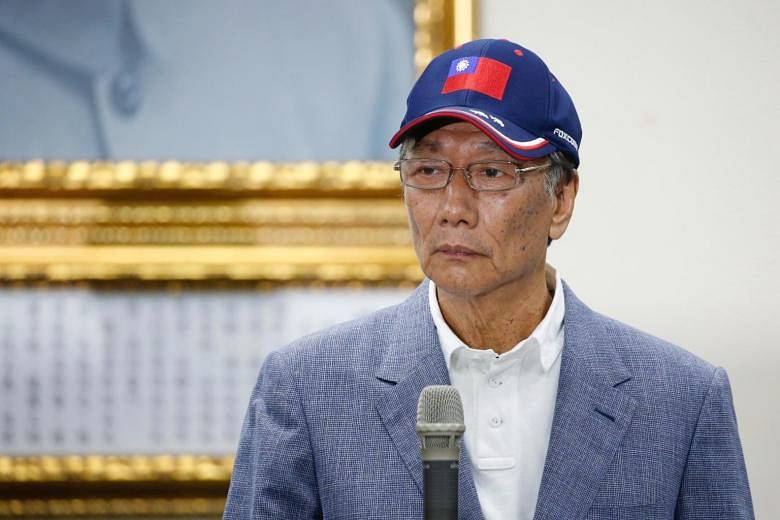TAIPEI(BLOOMBERG, REUTERS) - Taiwan's main opposition party snubbed billionaire Foxconn owner Terry Gou and chose a political outsider as its best hope of returning to power in next year's presidential election, as incumbent Tsai Ing-wen prepares for an uphill reelection bid.
Mr Han Kuo-yu, the firebrand mayor of the southern port city of Kaohsiung, overcame Mr Gou and three other candidates in the Kuomintang's presidential primary, KMT spokesman Cheng Mei-hua said on Monday (July 15).
Mr Han got a weighted average support of 44.8%, while Mr Gou got 27.7%.
Former New Taipei City Mayor Eric Chu came in third with 17.9%.
The results leave a great deal of uncertainty about Mr Gou's future after he relinquished his position as chairman of Foxconn Technology Group, the main assembler of Apple Inc's iPhone, to focus on the presidential race.
He has declined to categorically dismiss mounting speculation that he would consider running as an independent if he failed to secure the KMT nomination.
Mr Gou, who launched an extensive primary campaign including banners on buses and online advertisements, cancelled a press conference originally scheduled for later on Monday and was not immediately available for comment.
The party conducted a public poll July 8-14, with 15,185 respondents. Mr Han's official nomination needs approval by the KMT's central standing committee Wednesday, and its national congress on July 28.
Mr Han's victory over Mr Gou's financial muscle sets him up as the main challenger to Ms Tsai of the ruling Democratic Progressive Party in January's vote, which is shaping up to be the most closely fought race since Taiwan was first able to elect presidents in 1996.
Mr Han's support of closer ties with China is one of his starkest dividing lines with Ms Tsai, a critic of Beijing who hails from a pro-independence party, and could raise to fever pitch the debate about the island's fragile relations with the mainland and the US.
Mr Han's win is the latest step in his meteoric rise over the past year, from political obscurity to a step from the presidency. The 62-year-old was head of a government controlled agricultural produce distributor in Taipei when the KMT asked him to run for Kaohsiung mayor - after it had already been rebuffed by several of its preferred candidates.
His everyman persona, populist message of prioritizing economic growth and closer ties with China, and legions of dedicated "Han fans" propelled his mayoral victory in a city normally considered a DPP stronghold.
"The Han wave is real, but it remains to be seen whether it has peaked already. He's popular within the KMT, not least because of his big victory in 2018. But his pro-China views are less resonant in the context of the Hong Kong unrest," said Shelley Rigger, political science professor at Davidson College and author of "Why Taiwan Matters: Small Island, Global Powerhouse."
"The big question for voters is likely to be, can he pull off an improvement in cross-strait relations without giving away too much?"
Another mayor - Taipei's Ko Wen-je - is widely expected to announce his entry into the race as an independent in the coming weeks. Earlier this year, he described Taiwan and China as partners in an "arranged marriage" who had fallen "madly in love." He's also said that peace talks are "inevitable" between the democratically run island and Communist-ruled China. Using 1970s-style Chinese nationalist rhetoric, he's portrayed the election as a battle for the soul of the Republic of China, the official name of Taiwan's state.
Ms Tsai, on the other hand, dismisses Beijing's claims to sovereignty over Taiwan. She has strengthened the island's informal alliance with America and sought to bolster its defense capabilities against a potential Chinese invasion with a series of military-hardware purchases.
The US State Department last week approved a more-than $2 billion weapons sale to Taiwan, including top-of-the-range tanks and missiles.
Mr Han has "made statements that have suggested he is more pro-Beijing than he has let on during the campaign, and his true views are likely to catch up to him as he tries to draw a contrast with Tsai on cross-Strait relations during the general election," said Mr Derek Grossman, a senior defence analyst at Rand Corp.
"If Han were to win, the US-Taiwan defence relationship would be fine, so long as there is no evidence that his victory was the result of Chinese interference and that his decisions, once in office, are purely his own and not controlled or overly influenced by Beijing," Mr Grossman said.

